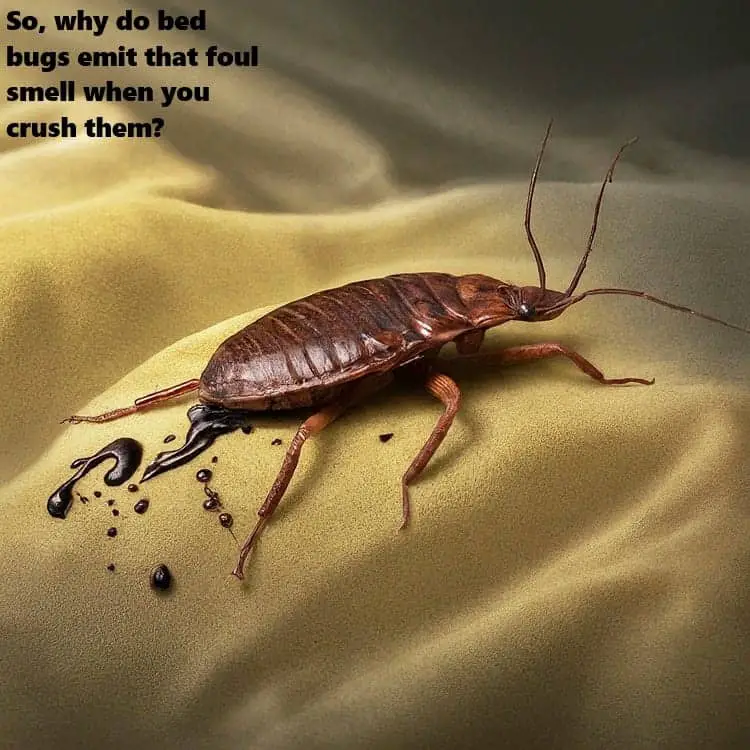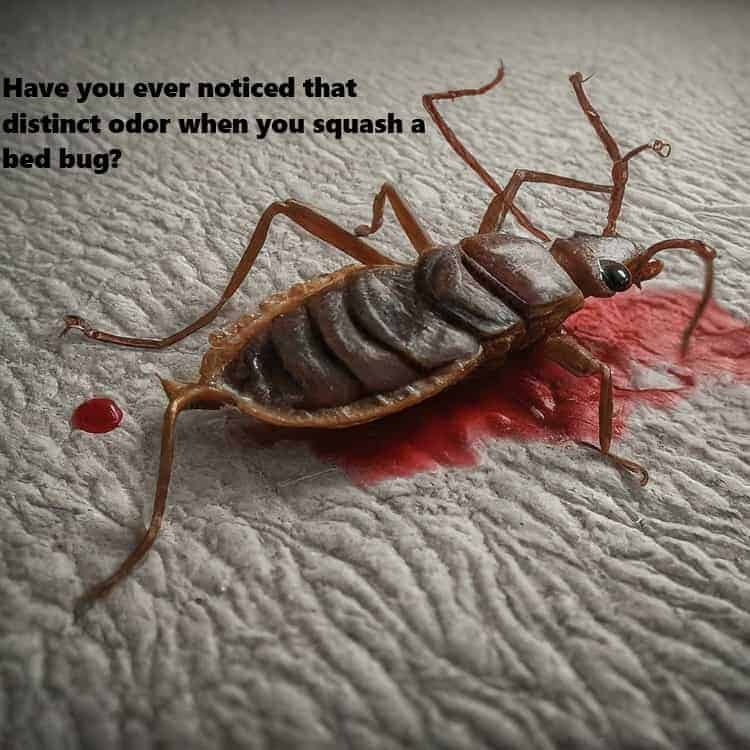Have you ever noticed that distinct odour when you squash a bed bug? It’s a smell that can linger and leave you wondering: why do bed bugs smell when you kill them?
There’s a certain grim satisfaction in squashing a bed bug. After all the torment these little vampires of the night put you through with itchy bites and sleepless nights, revenge feels sweet, doesn’t it?
But then comes that moment…that unmistakable odour.
So, why do bed bugs emit that foul smell when you crush them? The answer lies in their unique biology.
Like many insects, bed bugs possess scent glands that release defensive chemicals when they feel threatened or crushed. These chemicals, known as alarm pheromones, serve as a warning signal to other bed bugs in the vicinity, alerting them to potential danger.
Why Do Bed Bugs Smell When You Kill Them? It’s All About Communication (Even in Death)
Bed bugs, like many insects, are masters of chemical communication. They use unique smells called pheromones to send messages to each other.
These pheromones can serve as alarm signals, attract mates, or even help them find their next meal (that’s you!).
The release of the odour serves a specific purpose for bed bugs. It acts as a warning signal to other bed bugs in the area, alerting them to potential danger.
By releasing the alarm pheromone, bed bugs communicate the presence of a threat and trigger a defensive response among the remaining bugs.
This mechanism helps them to survive and avoid extermination.
When you crush a bed bug, you’re essentially rupturing a cocktail of scent glands. The most potent culprits in this stinky mix are:
- Alarm Pheromones: Those squashed bed bugs release a distress signal. It’s their way of screaming “danger!” to fellow bed bugs, causing them to scatter and hide. It’s not exactly the most efficient extermination tactic.
- Histamine: If you’ve ever had an allergic reaction, you’re familiar with histamine. Bed bugs store this chemical, adding to the mix of scents wafting through the air.
- Blood (If They’re Well-Fed): Freshly-fed bed bugs leak that rusty-smelling, iron-rich blood they’ve stolen from you.
How to identify the smell of individual bed bugs:
When you crush a single bed bug, the scent released can be pretty unpleasant. It’s often described as faint, musty, and slightly sweet.
Some have compared it to the aroma of overripe berries, while others find it more akin to a pungent, earthy smell.
How can you tell you have bed bug infestation:
Large infestations emit a much more distinct and offensive odour. This smell is often described as heavy, musty, and unpleasant.
Some individuals compare it to the smell of old blood, metal rust, or even damp, unwashed laundry.
Read More: Will A Hairdryer Kill Fleas?
How to Tell if You Have Bed Bug Bites

Bed bug bites can be tricky to identify because they mimic other skin conditions. However, there are some key signs to watch for:
- Appearance: Look for small, itchy, red welts in lines, clusters, or zigzags. While you sleep, these typically appear on exposed skin, like your arms, shoulders, legs, and face.
- Itching: Bed bug bites are intensely itchy, and scratching can worsen the irritation and lead to infection.
- No pattern: Unlike mosquito bites, bed bug bites don’t follow a specific pattern and can appear anywhere on your body.
However, it’s advisable to note that not everyone reacts similarly to bed bug bites.
Some people may not experience symptoms, while others may react severely with blisters or swollen welts.
Read More How To Get Rid Of Cockroaches In The House
Are Bed Bug Bites Dangerous?
While not inherently dangerous, bed bug bites can be uncomfortable and irritating.
Additionally, scratching excessively can increase the risk of infection.
However, bed bugs don’t transmit diseases like mosquitoes or ticks.
You must consult a doctor for proper diagnosis and treatment if you experience severe itching, swelling, or signs of infection (redness, pus).
How to Know if You Have Bed Bugs
- Bites: As mentioned earlier, itchy red welts in clusters or lines are a telltale sign.
- Blood stains: Look for tiny red or brown spots on your sheets, pillowcases, or mattress from crushed bed bugs.
- Rusty or dark spots: These are likely bed bug droppings, which look like small, dark smears.
- Shed skin: As bed bugs grow, they shed their outer shell, leaving behind pale yellow casings near their hiding spots.
- Musty odour: A sweet smell can indicate a large bed bug infestation.
- Live bugs: Inspect your mattress seams, box springs, and furniture crevices for small, reddish-brown insects.
- Unexplained bites: If you wake up with unexplained itchy bites, especially consistently, consider bed bugs a possible culprit.
How to Get Rid of Bed Bugs: 11-Step Guide
- Inspection: Thoroughly inspect your mattress, bed frame, furniture, and surrounding areas for signs of bed bugs.
- Cleaning: Vacuum meticulously, paying close attention to cracks, crevices, and furniture. Wash bedding in hot water (above 120°F) and dry on high heat.
- Encasement: Encase your mattress and box spring in tight-fitting, zippered covers to trap any existing bed bugs and prevent new ones from entering.
- Treatment: Depending on the severity of the infestation, consider using insecticidal sprays, dusts, or traps. Always follow instructions carefully and prioritize safety.
- Be cautious while travelling: Bed bugs are excellent hitchhikers and can easily find their way into your luggage or clothing while staying in infested accommodations. Before settling in, inspect hotel rooms for signs of bed bugs, such as tiny bloodstains or dark spots on the mattress. Keep your luggage off the floor and use luggage racks or protective covers.
- Seal cracks and crevices: Seal any cracks or gaps in walls, floors, or furniture where bed bugs could hide. This reduces their hiding spots and makes it more difficult for them to infest your home.
- Reduce clutter: Minimize clutter in your home, as it provides numerous hiding spots for bed bugs. Keep your living space tidy and organized, making detecting and treating any potential infestations easier.
- Be cautious with shared spaces: If you live in a multi-unit building, be mindful of shared laundry facilities, common areas, and adjoining walls. Bed bugs can quickly move between units, so take precautions to prevent them from spreading.
- Be cautious with second-hand items: Avoid bringing second-hand furniture, mattresses, or clothing into your home without thoroughly inspecting them. Bed bugs can hide in these items and quickly spread throughout your living space.
- Educate yourself: Learn about the signs of a bed bug infestation and how to identify them. The earlier you detect a problem, the easier it is to address it promptly.
- Professional help: Consult a licensed pest control professional for severe infestations for effective treatment and guidance.
Where Do Bed Bugs Hide?
Bed bugs are excellent hiders and prefer dark, secluded areas close to their food source (you!).
Here are some common hiding spots:
- Mattress seams and folds
- Box spring cracks and crevices
- Headboard and footboard joints
- Bed frame crevices and gaps
- Furniture upholstery seams and folds
- Behind baseboards and wall hangings
- Luggage and clothing
By being vigilant and taking the necessary steps, you can identify and eliminate bed bugs from your home, ensuring a peaceful and healthy sleep environment.
Wrap-Up On: Why Do Bed Bugs Smell When You Kill Them?
So, why do bed bugs smell when you kill them? It’s all about their innate defence mechanisms and the release of alarm pheromones.
The next time you encounter a bed bug and notice that unpleasant odour, remember it’s a testament to their remarkable survival strategies.
While the smell may be a nuisance, it is crucial in bed bug communication and defence.
By understanding the science behind bed bug odour, we can gain valuable insights into their behaviour and develop more effective strategies for pest control.
Read More: Can I Sleep In My Room After Spraying Raid

